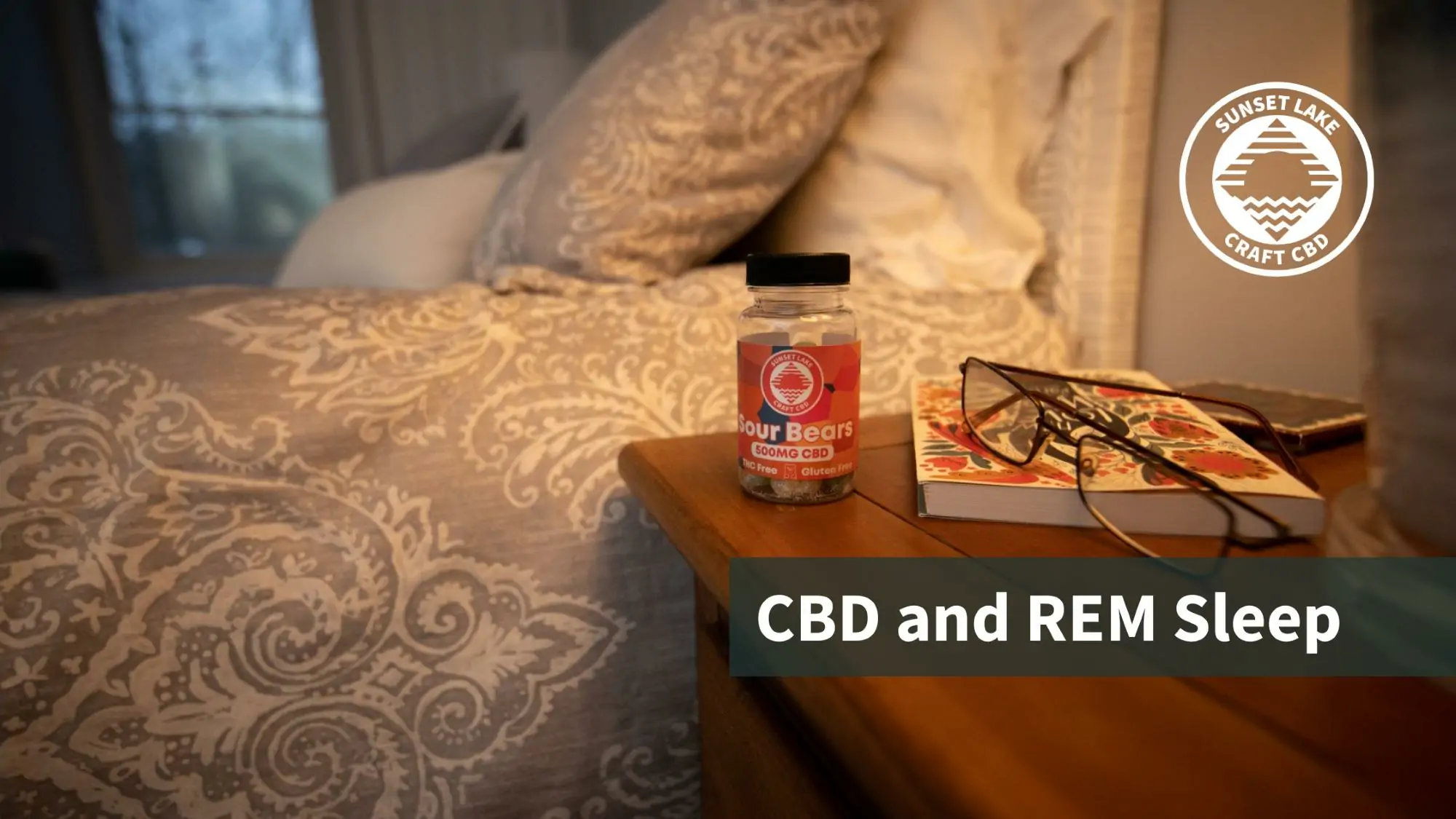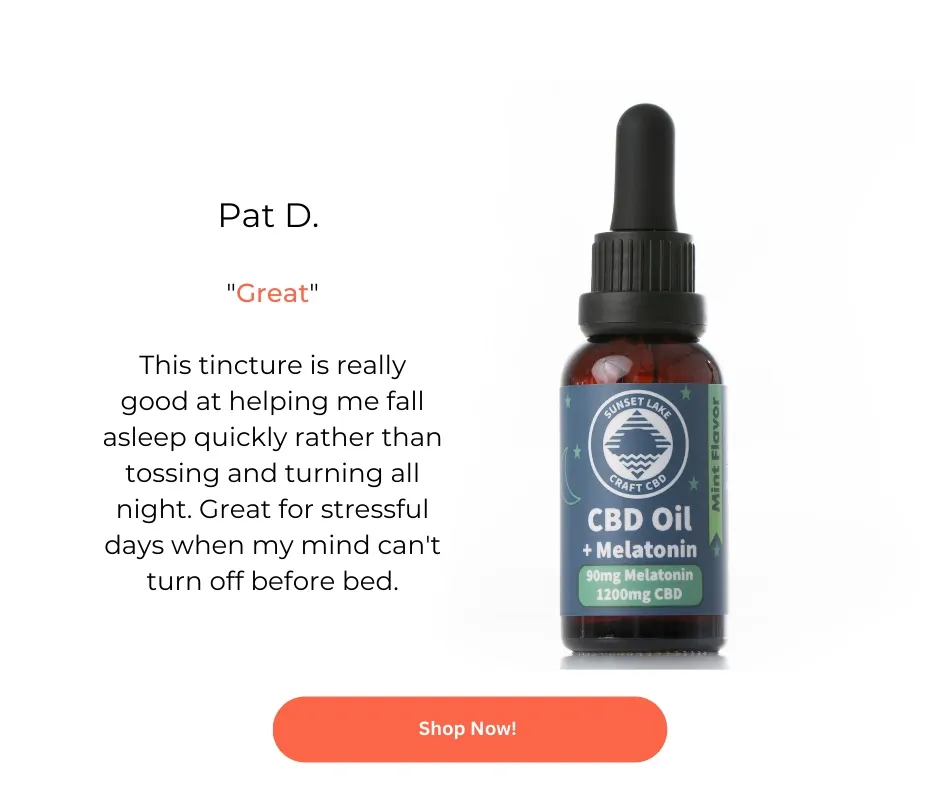No products in the cart.
Can You Use CBD To Improve Your REM Sleep?

Sleep is essential to our health, though it isn’t always easy to get. If you have trouble sleeping through the night, you’re not alone. More than 50 million Americans report having sleep-related issues. There are plenty of sleep aids on the market. CBD is one of the newest— marketed as an all-natural, hemp-derived option for folks who want to avoid more heavy-duty over-the-counter options. But is there any truth to the marketing hype that CBD can help with sleep? How about helping with REM sleep?
In this post, we’ll cover what CBD is, why REM sleep is important, and if it’s possible to use CBD to improve your REM sleep.
What Is CBD?
CBD is short for cannabidiol. It’s one of the hundreds of naturally occurring cannabinoids produced by flowering hemp plants. CBD is not psychoactive and will not make you feel “high” if you ingest it.
As of now, there aren’t many FDA-backed studies on CBD’s effect on humans, though there is an FDA-approved drug, Epidiolex, that’s derived from CBD oil and helps manage rare forms of epilepsy.
Does CBD Help With Sleep?
CBD is thought to indirectly improve sleep by inducing a sense of calm and relaxation, both of which may help users fall and stay asleep. It’s unclear if CBD improves the quality or increases the quantity of sleep and we won’t know without more FDA-backed studies.
There have been some interesting studies into how full-spectrum CBD may affect our sleep architecture which may have larger implications for CBD and sleep studies moving forward.
Related: CBD & Circadian Rhythm
What Is Sleep Architecture?
Sleep architecture refers to the different stages of sleep that our brains cycle through while we sleep. Two types of sleep, rapid eye movement (REM) and non-rapid eye movement (NREM) make up our sleep architecture. NREM constitutes about 75% of your total time spent asleep and REM sleep constitutes the other 25%.
Some sleep-tracking technologies like Fitbit and Apple Watches can actually show your sleep architecture by measuring both your heart rate and tossing and turning.
What Is REM Sleep?
Rapid eye movement sleep is the deepest state of sleep and is characterized by desynchronized brain wave activity, muscle atonia (the inability to move your muscles), and sudden rapid eye movements.
It’s commonly believed that dreams only take place during REM sleep, but that’s not true. A majority of dreaming happens during these short windows of REM sleep, though some dreams do take place during NREM sleep, too. A more accurate statement would be that most of our vivid dreaming experiences happen during REM sleep.
Why Is REM Sleep Important?
All sleep is important, but REM sleep plays a unique role in brain health and development. It’s also less common than NREM sleep— another reason to make sure you’re getting enough!
Emotional Processing
During REM sleep, your brain processes emotions by way of amygdala activation. Your amygdala is a small region in your brain that processes and organizes your emotional responses to stimuli— the most well-known example being the fight-or-flight response. Researchers theorize that your REM-stage dreams may be linked to processing strong emotions and fear.
Memory & Recall
During REM sleep, your brain reviews everything you may have learned that day. During REM cycles, your brain decides what information to commit to memory and what to forget. This is why researchers think that infants and toddlers require more sleep and generally spend more time in REM sleep than adults. There is so much to learn when you’re a newborn as opposed to when you’re an adult.
Brain Development
Right now, researchers believe that REM sleep plays a huge role in healthy brain development and is also the reason that newborns spend most of their time in REM sleep.
Waking Up
As opposed to NREM sleep, REM sleep activates more sections of our central nervous system and is believed to prime us for a new day.
Not Getting Enough REM Sleep?
A number of studies suggest that not getting enough REM sleep may interfere with memory, retention, and may even cause emotional dysregulation.
In general, not getting enough sleep can present many challenges, like
- Difficulty concentrating
- Fatigue
- Poor memory
- Food and impulse control
- And more…
Can CBD Help With REM Sleep?
If REM sleep is so important to memory, recall, and emotional regulation, it makes sense that we would want to get to sleep quickly, increase the amount of time we spend in REM, and reduce the time we spend tossing and turning every night, right?
Is it possible to optimize our sleep with CBD?
Yes and no.
A study published in 2013 found that rodents who were given medium- to high-dose CBD doses slept longer than rodents in the control group, meaning CBD may be able to help you stay asleep. Across the board, experts agree that getting more sleep is better. However, a review of studies found that the size of CBD doses may actually affect REM latency.
REM latency is the amount of time it takes to reach the REM stage of sleep. In the aforementioned rodent study, higher doses of CBD were found to increase REM latency, while medium-sized doses were found to reduce REM latency. What gives?
Not every study or review is going to have definitive conclusions— small-scale studies rarely do. As we delve further into the benefits of CBD and its impact on sleep, we may notice that different dosing schedules affect sleep differently. It’s about finding that sweet spot. It may be that a CBD dose for you and your sleep may not have any effect on your neighbor.

CBD & REM Sleep Behavior Disorder
REM Sleep Behavior Disorder is characterized by aggressive movements during an individual’s rapid eye movement (REM) stage of sleep. It’s more common in older people with neurodegenerative diseases like Alzheimer’s and Parkinson’s.
In one small-scale study, CBD was found to help manage REM Sleep Behavior Disorder symptoms and reduce the frequency of aggressive movements.
Will CBD Interact With Prescriptions?
CBD can interact with other prescriptions that an individual might be taking, by slowing down the liver’s ability to break them down. If you’re considering using CBD to aid in your sleep, you should first consult your doctor and find out if CBD negatively interacts with any of your medications.
Should You Take CBD To Optimize REM Sleep?
Taking CBD to help with sleep is a personal decision and one that you should consider with your doctor first. Many have found that CBD can help improve the quality and quantity of sleep they get every night, but the flip side is that plenty of folks also don’t experience those benefits.
CBD isn’t a magic bullet for your sleep issues. But it may be a useful tool that you can use on your journey for a better night’s sleep.
Sources:
- Kuhathasan, Nirushi et al. “The use of cannabinoids for sleep: A critical review on clinical trials.” Experimental and clinical psychopharmacology vol. 27,4 (2019): 383-401. doi:10.1037/pha0000285
- Galbiati, Andrea et al. “The association between emotional dysregulation and REM sleep features in insomnia disorder.” Brain and cognition vol. 146 (2020): 105642. doi:10.1016/j.bandc.2020.105642
- Chagas, Marcos Hortes N et. al. “Effects of acute systemic administration of cannabidiol on sleep-wake cycle in rats.” Journal of psychopharmacology (Oxford, England) vol. 27,3 (2013): 312-6. doi:10.1177/0269881112474524
- Babson, K.A., Sottile, J. & Morabito, D. Cannabis, Cannabinoids, and Sleep: a Review of the Literature. Curr Psychiatry Rep 19, 23 (2017). https://doi.org/10.1007/s11920-017-0775-9
- Galbiati, Andrea et al. “The association between emotional dysregulation and REM sleep features in insomnia disorder.” Brain and cognition vol. 146 (2020): 105642. doi:10.1016/j.bandc.2020.105642
- Chagas, M H N et al. “Cannabidiol can improve complex sleep-related behaviours associated with rapid eye movement sleep behaviour disorder in Parkinson’s disease patients: a case series.” Journal of clinical pharmacy and therapeutics vol. 39,5 (2014): 564-6. doi:10.1111/jcpt.12179
